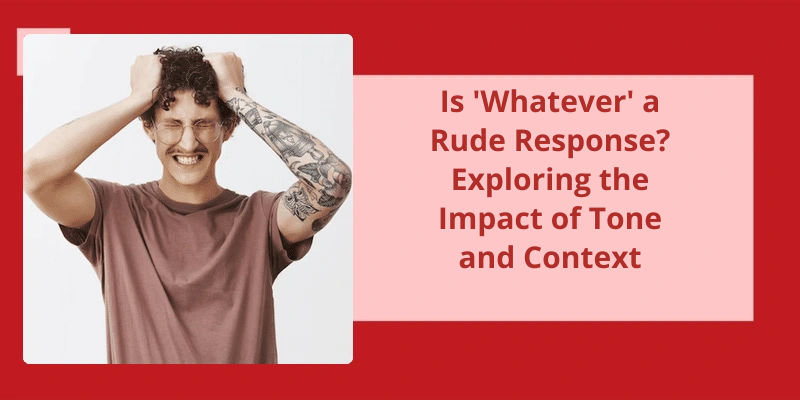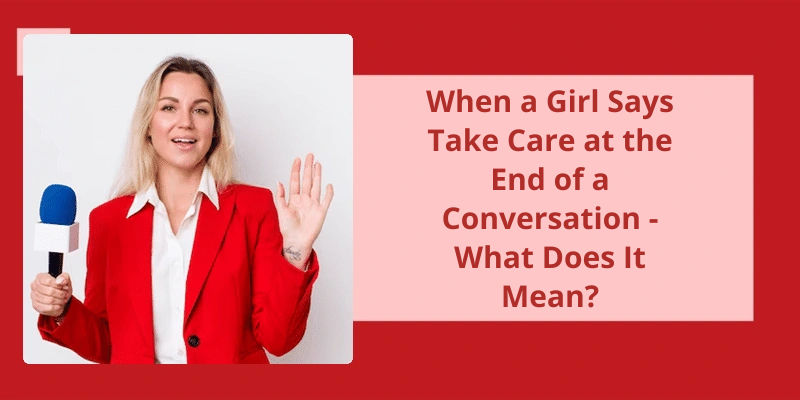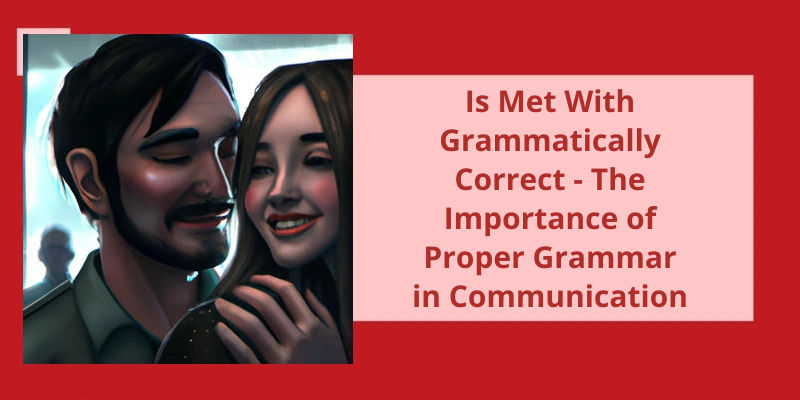Communicating effectively and respectfully is crucial in building positive relationships, whether it be in personal or professional settings. However, sometimes our responses can come off as rude or dismissive, even if that wasn't our intention. One of the most common rude responses is using the word "whatever". While it may seem harmless or a convenient way to end a conversation, it can actually send a negative message to the other person.
Is It Rude to Say Whatever You Want?
This type of language can be seen as a way to avoid taking responsibility or making a decision. It could be perceived as not wanting to engage in a conversation or not valuing the other persons input. Therefore, it’s important to be mindful of the tone and context in which “do whatever you want” is used.
Furthermore, when it comes to saying whatever you want, it’s essential to consider the impact your words may have on others. While it’s essential to be honest and authentic in communication, using hurtful language or making derogatory comments can be incredibly damaging. It’s important to recognize the line between being candid and being rude.
Just because you’ve the right to say something doesn’t mean you should say it. We all have different experiences, emotions and perspectives that shape the way we communicate with one another. It’s important to reflect on the impact of our words and consider how they may be received by others. A thoughtless comment, joke or opinion could be incredibly hurtful and disrespectful.
Ultimately, it’s essential to ask yourself why you feel the need to speak your mind. Are you angry? Frustrated? Feeling the need to assert yourself? By understanding the root of your desire to say what you want, you can better frame your message in a way that’s respectful, constructive and aligned with your values.
There’s nothing inherently wrong with expressing yourself honestly. However, it’s important to consider the impact of your words and the context in which they’re used. It’s essential to communicate authentically while also being considerate and mindful of how your words may be received by others. By finding a balance between honesty and empathy, we can create a more peaceful and respectful community in our personal and professional lives.
Using the word “whatever” in a conversation can be perceived differently depending on how it’s used. Some consider it to be impolite or dismissive, while others think it’s perfectly acceptable. It all comes down to the context and tone in which it’s used. Let’s explore this concept further.
Is Whatever a Polite Word?
In some cases, using “whatever” may be perceived as rude, particularly in situations where a person is expressing their emotions or opinions. It can come off as dismissive or uncaring, conveying the idea that you don’t value what the other person is saying. In these situations, it’s much better to use a more sensitive and empathetic approach to show that you care.
However, there are instances where “whatever” is an appropriate response, such as in situations where you’re agreeing with someone or giving them permission. For example, if someone asks if they can borrow your car, and you say “whatever you need,” it’s a helpful and polite reply. When used appropriately, “whatever” can be an effective way to communicate that you’re willing to be flexible and accommodating to the needs of others.
As long as youre respectful and thoughtful in your communication, using this word can be perfectly acceptable. However, if youre unsure about how to respond, it’s always better to err on the side of caution and use a more detailed response that shows you’re engaged and interested in the conversation.
It’s essential to consider the context and tone of the conversation before deciding to use it. If used inappropriately, it can come off as dismissive and rude. However, in some cases, it can be an effective way to convey understanding, flexibility, and agreement. As with any language, it’s important to be mindful of how you’re using words and phrases to ensure effective and considerate communication.
Tips on How to Communicate Effectively in Situations Where You Are Feeling Defensive or Frustrated, to Avoid Coming Across as Dismissive or Rude.
This article discusses effective communication techniques to avoid sounding defensive or frustrated in difficult situations. The tips provided will help individuals to have constructive and respectful conversations with others.
In today’s society, where communication is primarily done through text messages and instant messaging, the use of the word “okay” has become ubiquitous. However, it’s important to recognize that the simplicity of this response may not always suffice. Depending on the context of the conversation, using just “okay” may be perceived as rude or dismissive by the person you’re talking to as they might expect more from you than just a simple acknowledgment. Let’s explore this issue further in the following paragraphs.
Is Saying OK and Rude?
For example, if someone pours their heart out in a long text to you and your response is simply “okay”, it can come off as though you didnt really read what they said or don’t care about their feelings. In this case, it would be more appropriate to respond with a thoughtful message that shows you understand and care about what theyve shared.
On the other hand, there are also situations where saying “okay” is perfectly fine. For instance, if someone asks you a simple question that doesn’t require a lengthy response, such as “Can you meet me at the park at 2 pm?”, responding with “Okay” is sufficient and not considered rude.
Ultimately, communication is about more than just exchanging words. It’s about conveying understanding, empathy, and respect. If you want to have successful conversations with the people in your life, take the time to think about your tone and considerate what they might be feeling. By doing so, youll not only avoid coming off as rude, but youll also build stronger connections with the people around you.
It’s important to be mindful of the context and the person youre talking to in order to determine the appropriate response. By taking the time to craft thoughtful responses, you can improve your relationships and avoid misunderstandings. So, next time youre tempted to respond with a quick “okay”, take a deep breath and consider if theres a better way to show the person youre talking to that you care.
Conclusion
In conclusion, using "whatever" as a response to someone's words or ideas is a display of disrespect and a lack of consideration towards the other person. It can convey a negative and unproductive attitude, leading to misunderstandings and conflict. Instead, it's crucial to show empathy, respect, and understanding in communication to maintain healthy relationships in both personal and professional environments. Hence, choosing our words carefully and actively listening to the other person can avoid unnecessary tension and promote fruitful conversations.






